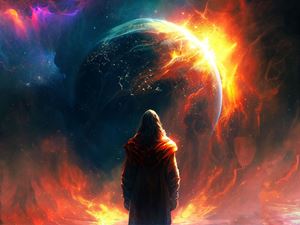
The question most frequently asked about the creation story in Genesis is probably also the least important – is the account historical or allegorical? There are devoted, believing Christians in both camps, and the messages contained in the narrative are just as powerful either way. It’s those messages we should focus on, to shine a light on the lessons we can draw from the story.
God is the source of all life.
As it says in John 1:3, all things were made through Christ. We see that at work in the creation story, as God pours his creativity into the beauty and variety of the natural world. Before the Fall, we see the true nature of God in his creation, where everything he made was good. In the creation narrative, Adam and Eve were placed in a deathless environment, indicating that death was never part of God’s purposes for us and has no part to play in eternity. We also see that God fellowshipped with Adam and Eve. He enjoyed spending time with them and shared their days. This too is a glimpse into the nature of God. He is loving, companionable, and adores us.
Men and women are equal expressions of God’s nature.
Despite the fact that God is referred to as ‘He’ throughout scripture, we should not reach the conclusion that men are more of an expression of God’s image than women are. Genesis 1:27 leaves no room for that idea, and equally implies that God is neither a man nor a woman, but is instead the full expression of male and female energy:
So God created mankind in His own image,
in the image of God He created them;
male and female He created them.
Whether male or female, we are all expressions of God’s nature. If we look at each other through that lens, we can see something of the character of God in each other.
God’s intentions towards us are always and only good.
God placed Adam and Eve in a perfect place, where they lived in intimate communion with him, with nature, and with each other. There are only three places in the Bible where the will of God is perfectly seen – in Eden before the Fall, in Heaven, and in the life and ministry of Jesus. God is a provider, a healer, and always ready to bless. It is easy to overcomplicate the will of God towards humankind, but the foundation of God’s intentions for us has never changed. He wants us to be happy and fulfilled, and it was only through humanity’s own choice that we began to experience hardship. Jesus spent his time on Earth relieving the suffering of others and speaking of God’s love, and in eternity we will find perfect, absolute fulfilment in our union with God and with each other. Eden is a symbol of this perfect union.
Judgement is the original sin.
An unavoidable aspect of the creation narrative is the presence of the Tree of the Knowledge of Good and Evil. If the creation story is understood as a literal account, the inclusion of this temptation in Eden might be seen as cruel, but if understood allegorically, it symbolises the ever-present opportunity to judge.
When Adam and Eve ate from the Tree of the Knowledge of Good and Evil, they embraced judgement, starting with the judgement of themselves. Adam and Eve strayed onto perilous ground, considering themselves able to determine what was good and what was evil. Tragically, their first application of that knowledge was to judge themselves evil.
The transformation was catastrophic, plunging them into self-rejection and shame. They perceived their nakedness and rejected their own flesh, fashioning garments from fig leaves before hiding from the God they had known and walked with. God called out to them, and Adam’s self-judgement was evident in his response (Gen 3:10):
I heard you in the garden, and I was afraid because I was naked; so I hid.
The so-called ‘knowledge of good and evil’ causes people to measure themselves against a standard and find themselves wanting. Adam and Eve regarded their own flesh and knew rejection. In those moments, they decided they weren’t good enough, that they didn’t deserve God’s love, that something was fundamentally wrong with them.
Not only did they judge themselves but each other, pointing the finger of blame. They also judged God, seeing him as a rule-keeping perfectionist instead of their loving creator. When humankind engaged in judgement, our entire perspective on ourselves, each other, and God changed, and not for the better.
God had told Adam and Eve that if they ate of the forbidden fruit, they would die. To apply that lesson more broadly, when we enter judgement, it poisons our hearts, robbing us of an innocent, easy connection with God, which is a form of spiritual death.
We cursed ourselves when we entered judgement. We made ourselves gods, assuming ourselves capable of determining good and evil, and attacking ourselves and each other. We hid from God, robbing ourselves of his love, and our sense of shame was not only born but leached out into every corner of our lives.
The goodness of God and His plan of salvation.
The creation narrative sets up the entire human story. It begins with the goodness of God, who made humanity in his image and loves to bless and fellowship with us. It establishes that each of us, whether male or female, is an expression of the divine image, and that we can learn much about God through knowing and loving each other. It also reveals the devastating effects of judging ourselves, others, and God, which in turn establishes the need for salvation from judgement and all its effects. The need for the Gospel is clear from the very beginning, and the creation story shows the unconditional love of God and all he would free us from.

